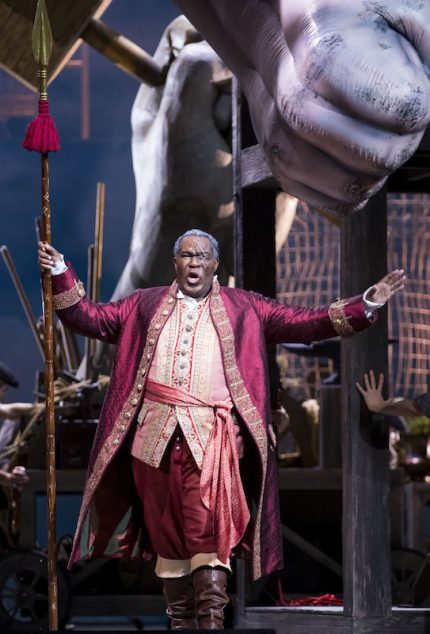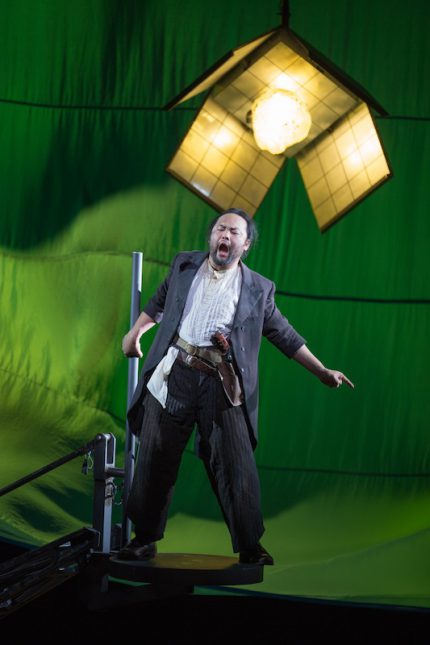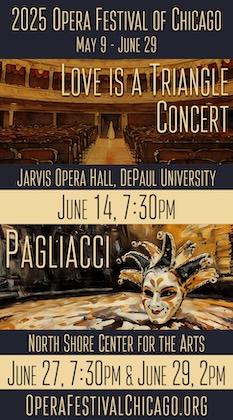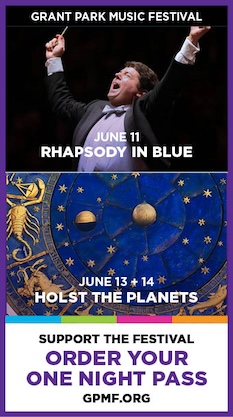A terrific cast shines brightly amid the mixed mechanics of Lyric Opera’s “Rheingold”

For those wary of stagings of Wagner’s “Der Ring des Nibelungen” that reset the action on Mars or in a Nazi prison camp, the good news is that Lyric Opera of Chicago’s production of Das Rheingold, which opened the company’s season Saturday night, largely plays the action straight. Or, at least as straight as one can, in a fantastical tale of greed, ambition, lust, gods, giants, evil dwarves, and the end of the world.
The much-anticipated production, which launches a new Lyric Ring cycle, had some lapses along the way, to be sure. But director David Pountney’s coolly modernist, play-within-a-play staging didn’t get in the way of Wagner’s glorious music, and for the most part provided a theatrical and intriguing backdrop for the cycle’s “Preliminary Evening.”
Das Rheingold opens Wagner’s tetralogy with the tale of Alberich, the malign dwarf rejected by the Rhinemaidens, who steals their gold and renounces love to gain vast fortune and power, fashioning his treasure into a golden ring. Wotan, king of the gods, is admiring his new fortress Valhalla, yet must contend with its builders, the giant brothers Fasolt and Fafner who take his sister-in-law Freia hostage for his refusal to pay for their labors. Advised by the cynical fire god Loge, Wotan steals the Rheingold away from Alberich, who curses the ring and all who possess it to death and destruction forever. Warned by Erda the earth goddess, Wotan reluctantly cedes the ring to the giants and Alberich’s curse immediately claims its first victim when Fafner kills Fasolt. The gods enter Valhalla, as the Rhinemaidens bewail the loss of their treasure.
The production by director Pountney and scenery designer Robert Innes Hopkins–based on designs by the late Johan Engels–presents a behind-the-scenes take on Rheingold, with sets that suggest a cross between the Globe Theatre and Industrial Age. The staging does away with traditional theatrical magic in postmodern fashion, revealing the stage artifice and mechanics, visible crews wheeling scenery and carts onstage and off.
The evening opens in eye-popping fashion, with the Rhinemaidens soaring high and swooping low to tease and evade the overheated Alberich, while the three cranes on which the singers perch are in full view of the audience, along with the stagehands operating them.
Just as imposing are the towering, four-story wooden scaffolds that frame the action on either side, revolving to reveal pairs of enormous heads and hands depicting the giants Fasolt and Fafner; the hands are lowered and worked by stage crews to ensnare Freia and threaten the gods. Also effective are the three stage elevators that depict the descent of Wotan and Loge to the red, furnace-like Nibelheim, where Alberich enslaves his brother Mime and minions to increase his golden hoard. The Norns also make an early appearance in this cycle and are constantly present, silently weaving their earthly strings.
Sadly, the production falls short in the opera’s most crucial moments. With crews always visible operating the scenery, the stage action often became crowded and chaotic. The Rhinemaidens’ gold stolen by Alberich resembled an antique lighting fixture swiped from an English pub. The impact of Fafner’s murder of Fasolt was diluted and visually confused, with the singers portraying the giants perched high above and the giant hands punching below, like Rock’Em Sock’Em Robots on steroids.
Most crucially, the climactic entrance of the gods into Valhalla proved a hollow letdown. The staging attempts to knock down the fourth wall, with the gods lined up, oddly slow-waltzing their way to the heavens via a succession of images of Lyric Opera’s painted stage curtain. The Rainbow Bridge is depicted, lamely, by brightly colored ropes leading to a tiny golden mockup of the stage set–suggesting less a majestic ascent into Valhalla than a pesky security line en route to a Pride event.
That misfire illustrates the production’s broader failing, one of tone and balance. God knows, there are many opportunities for humor–intended by Wagner and not–in Rheingold. But the approach of Lyric’s current production leans heavily toward the jokey and satiric, playing the action for laughs via costuming and visual gags–as with Loge’s entrance on a bright-red three-wheeled bicycle, and Alberich transforming himself into a serpent and frog by blowing up inflatable backpacks. The serious themes and philosophical depth of the work get decidedly short shrift, and in their attempts to demythologize Rheingold, Pountney and company too often seem to be goofing on Wagner’s opera, rather than illuminating it.
The prevailing irony makes the production’s biggest blunder seem even more out of place, with Wotan cutting off Alberich’s arm to gain the ring, a bloody bit of postmodern excess that suddenly turns the god into a violent sociopath and casts a pall over the rest of the evening. That business likely contributed to the scattered but robust booing that greeted Pountney and the rest of the production team at the curtain call.
Still, most of Pountney’s staging at least worked on its own terms, which is more than one can say for Marie-Jeanne Lecca’s costumes, which veered between bizarre and disastrous. There was nothing timeless nor evocative in Lecca’s campy, baffling getups. Wotan and Loge are attired in red Restoration-era coats, strangely evoking British generals in the Revolutionary War, and the gods’ elaborate feather hats looked like castoffs from The Three Musketeers. The god Froh gets an Asian motif for some reason and wears a fez. (Is he a Shriner?)
Production issues apart, Lyric’s Rheingold was an almost unqualified success musically, marking several impressive singer debuts.
Unfortunately, the single disappointing performance came from the evening’s star, Eric Owens. The bass-baritone has enjoyed several successful outings at Lyric and has won acclaim for his Alberich around the world, leading general director Anthony Freud to tap Owens for his first stage outing as the king of the gods.
Owens possesses an imposing instrument but he seemed vocally ill-suited to the role of Wotan, which calls for a wider vocal range than Alberich. He appeared to struggle at both ends, with short-breathed singing and a lack of sustaining weight for Wotan’s big moments. As the unbroken 2-1/2 hour action unfolded, the big singer seemed to lose stamina, reflected in Owens’ sedentary Wotan sitting in a chair admiring his Ring for most of the final third of the opera. Even with that staging assist, Owens seemed to be on fumes by the final scene, with Wotan’s praise of Valhalla effortful and sorely underpowered. Dramatically, Owens fared somewhat better without quite bringing a convincing nobility and gravitas to the role.
The rest of the large cast was vocally faultless from top to bottom. As Fricka, Wotan’s querulous wife, Tanja Ariane Baumgartner made a most successful U.S. debut. Tall and elegant, the German mezzo was an aptly regal presence and her warm, refined singing provided consistent pleasure.
Also making his American debut was Samuel Youn, who owned the evening with his staggering portrayal of Alberich. The Korean singer–who has also performed the role of Wotan to high praise–proved sensational both vocally and dramatically. Whether lusting after the Rhinemaidens, beating Mime and his workers, or boasting of his riches, Youn brought searing dramatic intensity to the role of the embittered dwarf. His sturdy, flexible bass-baritone handled all the role’s myriad challenges, and Youn’s delivery of Alberich’s curse was for once the darkly bone-chilling moment Wagner intended.
Stefan Margita is the finest Loge in opera today, and the veteran Slovakian tenor was the clear audience favorite opening night. His energetic performance as the fire god trickster crossed over into ham territory at times, with his director seemingly encouraging Margita’s over-the-top scenery-chewing rather than reining him in. Still, no one does Loge better, and Margita’s sinuous, liquid-like voice perfectly evokes the character of Wotan’s wily, Iago-like advisor. The tenor looked surprised and touched by the vociferous ovation he received at the curtain call.
As Fasolt and Fafner, Wilhelm Schwinghammer and Tobias Kehrer, respectively, proved a well-matched pair of deep-voiced fraternal giants, singing well and seemingly untroubled by their high positions on the scaffolding. Schwinghammer made the doomed Fasolt’s love for Freia affecting and Fafner’s sudden act of violence was firmly delivered by Kehrer.
Laura Wilde was a worthy Freia; her caressing of Fasolt’s giant hand and rejection of the gods after her release brought a new and somewhat unsettling Stockholm Syndrome twist to her captivity. Rodell Rosel’s juicy character tenor and acrobatic energy enlivened the fearful, resentful Mime.
The sudden appearance of the earth goddess Erda was the sit-up-in-your-seat moment it should be, with Okka von der Damerau’s dark and refulgent mezzo making her prophetic warning to Wotan an evening highlight.
The gods Donner and Froh are usually played for laughs these days as not-too-bright, would-be alpha males, and such was the case again. Even so, baritone Zachary Nelson was effective in Donner’s summoning of thunder, and Ryan Center tenor Jesse Donner’s fine vocalism as Froh managed to overcome his unfortunate costuming.
One will rarely encounter a finer trio of Rhinemaidens than that served up in this Lyric staging. Diana Newman, Annie Rosen (both Ryan Center members) and Lindsay Ammann were a fearless trio, lolling about on the high cranes, singing magnificently, and bringing leggy sensuality to the temptress roles, which made Alberich’s feckless lusting wholly credible.
Andrew Davis’s Wagnerian bona fides are well known by now. His conducting was fluent, meticulously balanced and always supportive of the singers while keeping the action moving as surely as the rolling of the Rhine. Apart from a brief brass fluff in Donner’s storm summons, the playing of the Lyric Opera Orchestra was as polished, responsive and idiomatic as one would expect from this highly experienced Wagner ensemble.
Das Rheingold runs through October 22. lyricopera.org; 312-827-5600.
Posted in Uncategorized



Posted Oct 02, 2016 at 6:10 pm by Anne-Marie
After reading this review I am less keen on adding this opera to my subscription as I do not take well to the “gimmicky” production style that the Lyric seems to eschew of late- read last season’s vulgar Figaro. The vocal casting drew my interest but the directorial and staging approaches are giving me second thoughts. Another review by a respected critic made similar observations.
Posted Oct 02, 2016 at 9:15 pm by Issa Cagret`
I’m afraid the review and the above comment nail the problems of this Rheingold and, eventually, Ring Cycle. A worn out Wotan simply is insufficient for the Ring Cycle. How will Owens make it through an entire cycle?
Worse, why would anyone buy tickets to Rheingold that actually drew awkward laughter for the ridiculous flailing fists,bizarre costumes amid the aforementioned catcalls. And Rainbow strings?
Well, at least people can save their time and money. And donors (and the BOD) would do well to ask Mr. Freud a simple question : “Why?”.
Posted Oct 02, 2016 at 11:54 pm by Larry Lapidus
I attended the opening last night. I couldn’t have been more disappointed than in this production. It was busy, unattractive, confusing, and hardly what Wagner would have desired. The “Ring” is musical drama, not cute, funny or kitchy. The entrance into Valhalla was my greatest disappointment. Rainbow colored rope doesn’t do it for me and can’t imagine for anyone else familiar with this brilliant opera.
The singing was glorious. I just hope Eric Owens rebounds from his disappointing singing. I have heard him sing many times before, he is a flawless performer. “Die Walkure” next season has to be better.
Posted Oct 03, 2016 at 12:24 pm by Benjamin
I have to disagree with other posters here. Yes, there were a lot of moving pieces both literally and figuratively, but for a contemporary production, this was both a reasonable and enjoyable traversal of Rheingold.
Those who suggest avoiding this production are doing a disservice to those who love Wagner at his most musical and to Lyric, which has pulled out all the stops for this production. Aside from Wotan, the cast was glorious and deserves to be heard. Davis conducted a fluid reading of the score.
All the stage machinery and the concept of the stage within a stage essentially worked for me. Even the giants were effective although the killing of Fasolt was a bit silly. Given other Rheingolds I have endured, this is faithful and enjoyable. Do yourself a favor and judge for yourself.
Posted Oct 07, 2016 at 9:22 am by Rick Boyum
At the second performance of Das Rheingold, Eric Owens sang a full-voiced and rich Wotan. It was everything the audience expected/hoped for and great applause greeted his curtain call.
I attended both the opening night that is reviewed above and the next performance on Wednesday. I agree that Eric Owens had problems on opening night that to me resemble the same head and sinus cold from which I currently suffer. No announcement was made announcing his indisposition on opening night…though third-hand information informed me that he sang half-voice during the dress rehearsal.
If indeed there was a tough spell for him, it appears to be over and I believe audience members who will attend the remaining performances have quite a good chance of hearing a superb Wotan.
The rest of the cast is just as good as can be put together on any world stage in these years. So treat yourself.